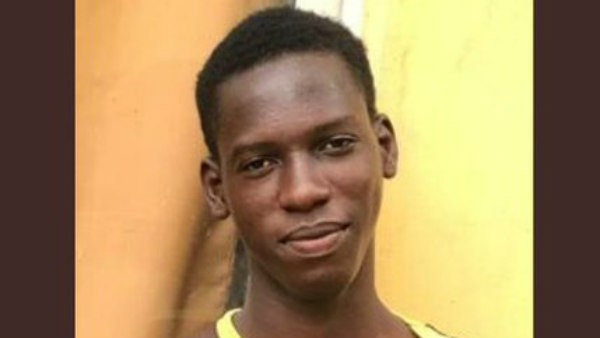Today is exactly 138 days (over four months) since Pelumi Onifade was last seen alive, but the Nigerian authorities are yet to bring to account those responsible for the young journalist’s murder. His family, school mates and media colleagues are yet to recover from the shock of his brutal death, their sense of grief made more poignant by the silence of those who are to act to unravel the killing and help bring closure to the matter.
On October 24, 2020, Onifade, who was covering the #EndSARS protests for Gboah TV, an online television channel, was attacked by security officers and carried away alongside a mob arrested by the Lagos State Task Force for exploiting the protests to loot a COVID-19 relief facility. About a week later, the body of the student journalist was found in a mortuary in Ikorodu Lagos. His family lawyer said his body had bullet wounds.
Onifade was a 200-level student of the Department of History at Tai Solarin University of Education, Ogun State, and an intern at Gboah TV .
His assailants were members of the security task force that had been deployed to clamp down on hoodlums who had infiltrated the protesters and looting relief items stored in a warehouse at the Agege area of Lagos. Even after identifying himself as a journalist, he was brutalised by the security officers and dragged away alongside dozens of the miscreants during a deadly clash between the task force and the hoodlums.
Onifade reportedly died in police custody from the injuries he sustained from the severe beatings and his body deposited at the mortuary with the news of his death withheld from his family members.
It took five days of search of police stations and prisons by Onifade’s family members and employers before they received information that his corpse was at a mortuary at Ikorodu, Lagos.
The young journalist’s death generated outrage as thousands of Nigerians poured out their emotions on social media with the hashtag #JusticeforPelumi.
“Pelumi Onifade was 20 years old! We have lost another promising Nigerian youth…due to recklessness and a lack of value for human lives. Nobody has been held accountable till this very moment. How safe are we in Nigeria?” a popular comedian and #EndSARS campaigner, Debo Adedayo, tweeted in November 2020.
“No justice has been got for my son. The authorities have not done anything,” the journalist’s mother, Bose, in an emotion-laden voice, told MFWA on the phone. “I am still in distress,” she added. “No compensation has also been paid to the family.”
The #EndSARS protests were against the human rights abuse of the now-disbanded Special Anti-Robbery Squad of the Nigeria Police.
The #EndSARS protests, which garnered international attention, came to a head on October 20 when soldiers reportedly fired at several unarmed demonstrators at the Lekki tollgate in Lagos, killing many. After the youths demanded justice for all victims of police brutality, the Lagos State Judicial Panel of Inquiry was set up to investigate all cases of abuse.
The spokesperson for the Lagos police command, Muyiwa Adejobi, said Onifade’s death was among those investigated by the panel.
“I can’t speak on it since the matter is with the panel,” Adejobi told the MFWA. The panel has not responded to enquiries by the MFWA.
Onifade’s colleagues at Tai Solarin University of Education are equally in shock and demanding justice.
“We are demanding an explanation of what happened to our colleague,” said Abdulazeez Soneye, the President of the Student Union Government.
An official with a Lagos group, the Education Rights Concern, Daniel Abayomi, called on the panel of inquiry to ensure justice prevails in Pelumi Onifade’s case.
“It has been over four months since his death, yet no one has been punished. This is unfair to the family of the journalist,” Abayomi told the MFWA via phone.
The Wole Soyinka Centre for Investigative Journalism had in an email demanded an end to impunity against journalists in Nigeria and globally.
“The rate of killings and the motives behind them are constant reminders that violence against journalists is still rampant and failure to combat impunity against journalists is an indictment on the authorities,” the Centre said.
Meanwhile, this was not the first time Nigerian journalists were murdered in similar circumstances.
Precious Owolabi, a 23-year-old journalist for Channels TV, was on July 22, 2019, reportedly hit by a stray bullet while covering the shooting of members of the Islamic Movement of Nigeria by the security forces in Abuja.
Owolabi later died in the hospital, and according to the Nigeria Union of Journalists, no one has been brought to account for his murder.
Alexander Ogbu, a reporter and editor of Regent Africa Times, also died from head injuries sustained after being hit by a bullet during a crackdown on a protest by the Islamic Movement of Nigeria on January 21, 2020, in Abuja.
The autopsy conducted on his remains revealed that Ogbu, who was 50 at the time, died as a result of brain evisceration.
The Media Foundation for West Africa joins the family and friends of Pelumi Onifade, and the media fraternity in Nigeria to demand justice for the slain journalist. The Nigerian authorities should be alarmed at the rate at which the security force’s crackdown on protests has been resulting in the killing of civilians including journalists on duty.
It is a blot on Nigeria’s press freedom and general human rights record that in almost all the cases, no conclusive investigations have been carried out, much less prosecution of the culprits.
We call for thorough investigations into the death of the journalist and justice for his grieving family and friends.





